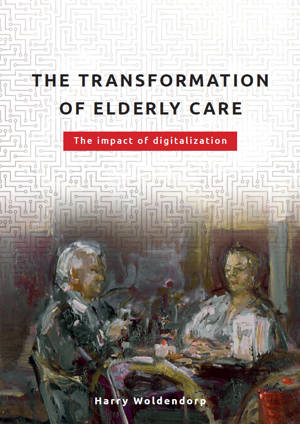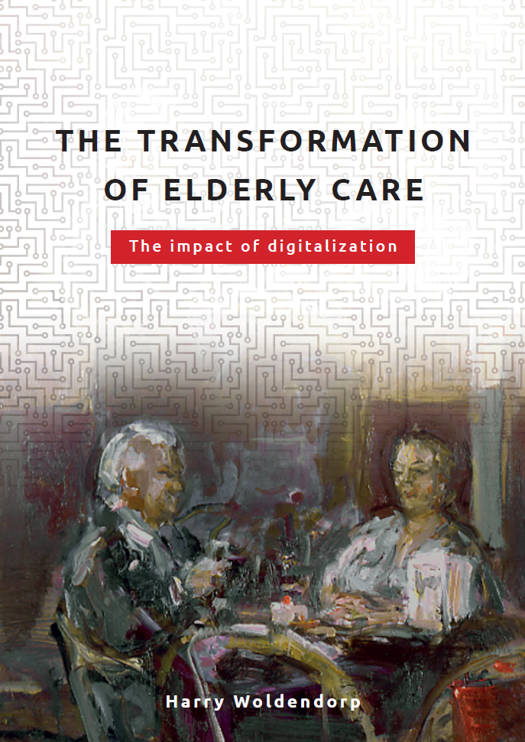
- Afhalen na 1 uur in een winkel met voorraad
- Gratis thuislevering in België vanaf € 30
- Ruim aanbod met 7 miljoen producten
- Afhalen na 1 uur in een winkel met voorraad
- Gratis thuislevering in België vanaf € 30
- Ruim aanbod met 7 miljoen producten
Zoeken
The transformation of elderly care E-BOOK
The impact of digitalization
Harry Woldendorp
E-book | Engels
€ 14,90
€ 18,90
Omschrijving
The quality of care is largely determined by the quality of the relationship between the client and the care professional. The redesign of the interaction is about striking a good balance between the client perspective and the professional perspective. The core objective is to arrive at an equal positioning in an asymmetrical relation.
Large scale use of digitalization and healthcare technology may lead to more individual control, a higher quality of life and a more efficient use of scarce healthcare professionals. The convergence of Blockchain, AI and the IoT will form an impactful combination of security, interconnectivity and autonomy and lead to fundamental changes in the way processes run.
The strengthening of the directing role of clients translates into greater variety in the interaction with the professional. This is not only about the role of the client, but also about the possibilities that the care offers. Precision medicine is about applying interventions that exactly match the specific illness of the individual patient. Personalized care and positive healthcare reinforce each other. Preventive and lifestyle support are reinforcing in reducing the vulnerability of the elderly. Healthcare technology and remote monitoring are aimed at increasing quality and improving the effectiveness of care deployment. The empirical material has mainly come from a large number of literature, reports and theses that have been written about elderly care in the Netherlands
The use of technologies (hardware) and digitalization (software) creates opportunities for the autonomy and self-reliance of the elderly. The impact of technology and digitalization is often still unclear for healthcare professionals.
Organizations and professionals are confronted with innovations happening faster than they can process with current organizational forms. They face uncertainties about the impact of digitalization and new technologies on the work they do.
Technological and social innovation are connected with each other. These developments give the patient more and more access to their own health information. The effects of digitalization on elderly care will also increase at an accelerated pace.
Large scale use of digitalization and healthcare technology may lead to more individual control, a higher quality of life and a more efficient use of scarce healthcare professionals. The convergence of Blockchain, AI and the IoT will form an impactful combination of security, interconnectivity and autonomy and lead to fundamental changes in the way processes run.
The strengthening of the directing role of clients translates into greater variety in the interaction with the professional. This is not only about the role of the client, but also about the possibilities that the care offers. Precision medicine is about applying interventions that exactly match the specific illness of the individual patient. Personalized care and positive healthcare reinforce each other. Preventive and lifestyle support are reinforcing in reducing the vulnerability of the elderly. Healthcare technology and remote monitoring are aimed at increasing quality and improving the effectiveness of care deployment. The empirical material has mainly come from a large number of literature, reports and theses that have been written about elderly care in the Netherlands
The use of technologies (hardware) and digitalization (software) creates opportunities for the autonomy and self-reliance of the elderly. The impact of technology and digitalization is often still unclear for healthcare professionals.
Organizations and professionals are confronted with innovations happening faster than they can process with current organizational forms. They face uncertainties about the impact of digitalization and new technologies on the work they do.
Technological and social innovation are connected with each other. These developments give the patient more and more access to their own health information. The effects of digitalization on elderly care will also increase at an accelerated pace.
Specificaties
Betrokkenen
- Auteur(s):
- Uitgeverij:
Inhoud
- Aantal bladzijden:
- 208
- Taal:
- Engels
Eigenschappen
- Productcode (EAN):
- 9789461540317
- Verschijningsdatum:
- 15/06/2021
- Uitvoering:
- E-book
- Beveiligd met:
- Adobe DRM
- Formaat:
- ePub

Alleen bij Standaard Boekhandel
Beoordelingen
We publiceren alleen reviews die voldoen aan de voorwaarden voor reviews. Bekijk onze voorwaarden voor reviews.








